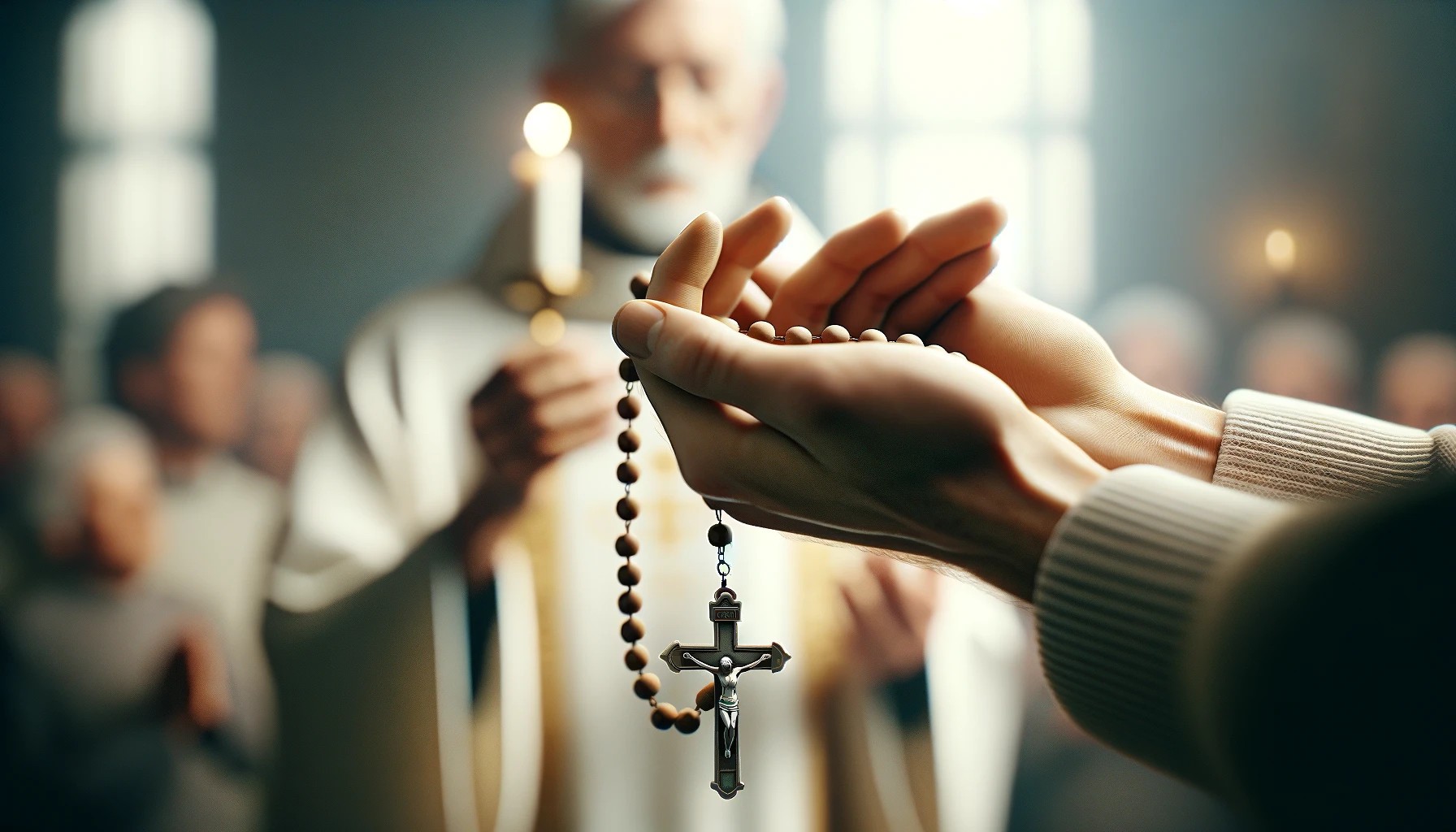Home>Theology and Spirituality>What Comes After Baptism And Confirmation


Theology and Spirituality
What Comes After Baptism And Confirmation
Published: February 29, 2024
Ericka Andersen, an editor at Christian.net, expertly merges digital strategy with content creation, focusing on faith and societal issues. Her communication skills enhance the platform's engaging narratives, fostering meaningful dialogue on belief's impact on society.
Discover the next steps in your spiritual journey after baptism and confirmation. Explore theology and spirituality to deepen your faith and understanding. Unlock the path to spiritual growth and fulfillment.
(Many of the links in this article redirect to a specific reviewed product. Your purchase of these products through affiliate links helps to generate commission for Christian.net, at no extra cost. Learn more)
Table of Contents
The Role of the Church in the Post-Baptism and Confirmation Journey
After the sacraments of baptism and confirmation, the church plays a crucial role in guiding individuals through their spiritual journey. The church provides support, guidance, and a sense of community to help individuals grow in their faith and relationship with God. Here are some key ways in which the church supports individuals in their post-baptism and confirmation journey:
-
Pastoral Care and Support: The church offers pastoral care to individuals who have been baptized and confirmed. This includes providing spiritual guidance, counseling, and support during times of difficulty or uncertainty. Pastoral care helps individuals navigate the challenges of living out their faith in the modern world.
-
Community and Fellowship: The church provides a community of believers who can offer support, encouragement, and fellowship. This sense of community is essential for individuals as they seek to deepen their faith and live out their commitment to God.
-
Education and Formation: The church offers educational programs and opportunities for spiritual formation to help individuals deepen their understanding of the faith. This may include Bible studies, theological classes, and opportunities for spiritual growth and development.
-
Sacramental Life: The church continues to provide access to the sacraments, such as the Eucharist and Reconciliation, which are essential for nurturing and sustaining the spiritual life of individuals who have been baptized and confirmed.
In summary, the church plays a vital role in supporting individuals in their post-baptism and confirmation journey by providing pastoral care, fostering a sense of community, offering education and formation, and facilitating access to the sacraments. This ongoing support and guidance from the church help individuals to deepen their relationship with God and live out their faith in the world.
Read more: How Is Baptism And Confirmation Related
Deepening Your Relationship with God
After baptism and confirmation, deepening one's relationship with God becomes a central focus. The church provides various avenues for individuals to nurture and strengthen their connection with the divine. Here are some essential ways to deepen your relationship with God:
-
Prayer and Meditation: Engaging in regular prayer and meditation is crucial for deepening your relationship with God. The church offers guidance on different forms of prayer, such as contemplative prayer, intercessory prayer, and the use of prayer beads, to help individuals connect with the divine.
-
Scripture Study: The church provides opportunities for individuals to study and reflect on sacred texts, such as the Bible and other religious writings. Understanding the teachings and wisdom contained in these texts can enrich one's spiritual journey and foster a deeper connection with God.
-
Participation in Worship: Actively participating in church services, liturgies, and sacramental celebrations allows individuals to engage in communal worship and connect with God through shared rituals and spiritual practices.
-
Spiritual Direction: Seeking spiritual direction from clergy or trained spiritual directors can provide valuable guidance and support in deepening one's relationship with God. These mentors offer insights and practices to help individuals grow spiritually.
-
Service and Charity: Engaging in acts of service and charity, both within the church community and in the wider world, can be a powerful way to deepen one's relationship with God. The church often provides opportunities for individuals to participate in charitable activities and outreach programs.
By actively participating in these practices and engaging with the resources and support offered by the church, individuals can deepen their relationship with God and continue to grow in their faith beyond the sacraments of baptism and confirmation.
Living Out Your Faith in the World
Living out your faith in the world is a natural progression after the sacraments of baptism and confirmation. The church provides guidance and resources to help individuals integrate their faith into their daily lives and interactions with the world. Here are some key ways to live out your faith in the world:
-
Ethical Decision-Making: The church offers moral and ethical teachings that guide individuals in making decisions aligned with their faith. This includes ethical considerations in personal, professional, and social contexts, helping individuals navigate complex moral dilemmas.
-
Social Justice and Advocacy: Engaging in social justice initiatives and advocacy efforts is a powerful way to live out one's faith in the world. The church often provides opportunities for individuals to participate in social justice campaigns, outreach programs, and community service projects that address issues of inequality, poverty, and human rights.
-
Witnessing and Evangelization: Sharing one's faith with others through personal witness and evangelization is an integral part of living out one's faith. The church offers guidance on how to communicate one's beliefs respectfully and authentically, fostering a spirit of openness and dialogue with others.
-
Integrating Faith into Daily Life: The church encourages individuals to integrate their faith into their daily routines, relationships, and decision-making processes. This may involve incorporating prayer into daily activities, seeking spiritual perspectives on challenges, and nurturing a faith-informed worldview.
-
Stewardship and Environmental Responsibility: Embracing stewardship principles and environmental responsibility is a way to live out one's faith by caring for the natural world and promoting sustainable practices. The church often provides resources and initiatives focused on environmental stewardship and ecological awareness.
By embracing these practices and engaging with the support and guidance offered by the church, individuals can effectively live out their faith in the world, making a positive impact on their communities and the broader society.
Continuing Education and Growth in the Faith
Continuing education and growth in the faith are essential aspects of the post-baptism and confirmation journey. The church provides a wealth of resources and opportunities for individuals to deepen their understanding of the faith and cultivate spiritual growth. Here are some key ways in which individuals can continue their education and growth in the faith:
-
Theological Study: Engaging in theological study allows individuals to explore the rich intellectual tradition of the church and deepen their understanding of theological concepts, historical developments, and contemporary issues. The church often offers theological courses, seminars, and workshops to facilitate ongoing learning and reflection.
-
Spiritual Retreats: Participating in spiritual retreats provides individuals with dedicated time for prayer, reflection, and spiritual renewal. These retreats, often organized by the church, offer a space for individuals to deepen their spiritual practices, seek guidance, and experience moments of profound connection with God.
-
Mentorship and Discipleship: The church encourages mentorship and discipleship relationships, where individuals can learn from more experienced members of the faith community. This mentorship may involve spiritual guidance, personal support, and the sharing of wisdom and experiences to aid in spiritual growth.
-
Exploration of Different Spiritual Traditions: The church may provide opportunities for individuals to explore different spiritual traditions within the broader Christian faith or even beyond. This exploration can enrich one's understanding of diverse spiritual practices and deepen their appreciation for the universal aspects of faith.
-
Engagement with Contemporary Issues: The church often addresses contemporary social, ethical, and moral issues from a faith perspective. Individuals can engage in discussions, seminars, and educational programs that help them understand how their faith intersects with current societal challenges and opportunities for positive change.
By actively participating in these avenues for continuing education and growth in the faith, individuals can deepen their spiritual knowledge, strengthen their connection with the church community, and continue to evolve in their faith journey. The church serves as a supportive and enriching environment for ongoing learning and spiritual development, nurturing individuals in their commitment to a lifelong journey of faith.
Embracing the Sacraments as a Lifelong Journey
The sacraments are not just one-time events but rather a lifelong journey of spiritual nourishment and growth. The church provides ongoing opportunities for individuals to embrace the sacraments and integrate them into their daily lives, fostering a deep and enduring connection with God. Here are some key aspects of embracing the sacraments as a lifelong journey:
-
Regular Participation in the Eucharist: The Eucharist, also known as the Holy Communion, holds a central place in the life of a Christian. The church encourages regular participation in the Eucharistic celebration, where individuals can encounter the real presence of Christ and receive spiritual nourishment through the reception of the body and blood of Christ.
-
Reconciliation and Healing: The sacrament of Reconciliation, also referred to as Confession, offers individuals the opportunity to seek forgiveness for their sins and experience spiritual healing. The church provides regular opportunities for the sacrament of Reconciliation, guiding individuals in the process of self-examination, repentance, and receiving God's mercy.
-
Anointing of the Sick: Embracing the sacrament of the Anointing of the Sick is a vital aspect of the lifelong journey of faith. The church offers this sacrament to individuals facing illness or significant health challenges, providing spiritual strength, comfort, and the grace of healing in times of physical and emotional distress.
-
Marriage and Holy Orders: For those called to the sacraments of Marriage or Holy Orders, the church supports individuals in embracing these vocations as lifelong commitments. The sacrament of Marriage is a sacred union that requires ongoing nurturing and spiritual growth, while Holy Orders entail a lifelong dedication to serving the church and the community.
-
Confirmation as a Stepping Stone: While Confirmation is often associated with adolescence, its significance extends throughout one's life. Embracing the gifts of the Holy Spirit received in Confirmation and continually seeking to live out the commitments made during this sacrament is an integral part of the lifelong journey of faith.
By actively engaging with the sacraments throughout their lives and availing themselves of the spiritual nourishment and grace offered by the church, individuals can deepen their relationship with God, experience ongoing spiritual growth, and find strength and support in the various seasons and challenges of life. The church serves as a guiding presence, offering the sacraments as essential sources of grace and sustenance for the lifelong journey of faith.















